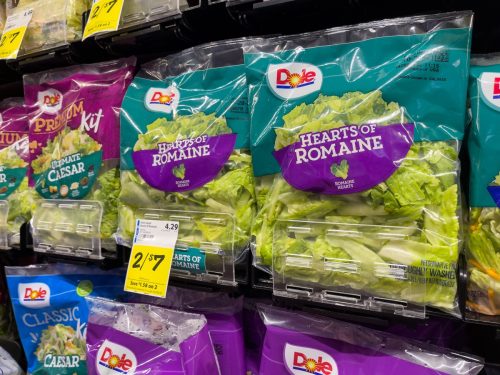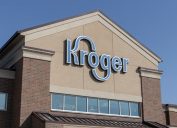Lettuce Is Disappearing From Grocery Store Shelves—Here's Why
A cyberattack has certain Dole products in short supply.

We all remember the early days of the COVID pandemic when it felt like striking gold if you found toilet paper and cleaning supplies at the store. But empty store shelves are unfortunately not just a thing of the past. Already this year, we've seen the supply of grocery staples like eggs waver dramatically. Now, another shortage seems to be striking certain parts of the U.S. Read on to find out why lettuce is disappearing from grocery store shelves.
READ THIS NEXT: All the Food Shortages Coming to Grocery Stores Soon, Experts Predict.
Shoppers have started to notice a lack of lettuce at stores.

If you've gone to your local grocery store for salad staples and found yourself out of luck, you're not alone. Several shoppers have taken to social media recently to comment on the lack of lettuce on shelves.
"Went to our [Kroger] store yesterday and there was no lettuce," one Twitter user from Colorado wrote on Feb. 19.
Another user tweeted on Feb. 11 about the same issue at different store: "The other night I went to the neighborhood Walmart & they didn't have lettuce… I was literally confused."
As it turns out, the problem runs deeper than shoppers realize.
Grocers say Dole products have been the hardest to stock.

The lettuce shortage seems to be limited to one brand in particular: Dole. Two grocers in Texas and New Mexico told CNN on Feb. 22 that they've struggled to stock Dole salad kits on their shelves for days now.
Jeff Russell, the assistant manager of product at Clayton Ranch Market in Clayton, New Mexico, said his grocery store has been short of salad kits since early last week.
"[Customers] are upset, but it happens. We can't do nothing about it except [put in the orders]," Russell told CNN, adding that the store was out of several of the company's prepackaged lettuce products, from Dole Chopped Sesame to Dole Butter Bliss.
Mary Underwood, an employee at Stewart's Food Store in Olney, Texas, told CNN that the grocer was also experiencing similar issues with Dole salad kits. According to Underwood, customers were questioning the lack of supply so often that the store had to post an alert on its official Facebook page.
RELATED: For more up-to-date information, sign up for our daily newsletter.
Dole was recently forced to temporarily shut down production.

There seems to be a clear but surprising explanation for the declining Dole lettuce supply. An internal memo from the company indicates that a cyberattack recently forced the produce giant to shut down production plants in North America and stop shipments to grocers, CNN reported.
"Dole Food Company is in the midst of a Cyber Attack and have subsequently shut down our systems throughout North America," Emanuel Lazopoulos, senior vice president at Dole's Fresh Vegetables division, wrote in a Feb. 10 memo to retailers. "Our plants are shut down for the day and all shipments are on hold."
Dole spokesperson William Goldfield confirmed in a Feb. 22 statement on the company's website that it had recently been hit with ransomware. "Upon learning of this incident, Dole moved quickly to contain the threat and engaged leading third-party cybersecurity experts, who have been working in partnership with Dole's internal teams to remediate the issue and secure systems," he wrote.
Dole is continuing to investigate the scope of this cyberattack, but its impact on the company's operations "has been limited," Goldfield said.
Dole has four processing plants in the U.S., according to CNN. A source familiar with the incident told the news outlet the company shut down its computer systems soon after the hack started in an effort to contain the spread of the ransomware. But it's unclear how long the company had to halt production at its North American plants because of the attack, per CNN.
Ransomware has become a major problem.

Dole is a multimillion-dollar company that uses email security software made by Fortinet, a California-based firm that is contracted to provide cybersecurity for other corporations and U.S. government agencies, according to CNN.
"For Dole Plc any downtime will put a spoil on revenue for the food industry leader," Fortinet explains on its website, which was written prior to the recent hack. "Ensuring visibility into the company's security infrastructure and developing quick responses are crucial components for keeping global operations running smoothly."
Ransomware can be unknowingly downloaded onto a computer system by opening an email attachment, according to the Federal Bureau of Investigation (FBI). It's defined as "a type of malicious software, or malware, that prevents you from accessing your computer files, systems, or networks and demands you pay a ransom for their return," the FBI explains.
This type of cyberattack has become a significant concern in recent years. A Forbes survey found that at least 80 percent of businesses in the U.S. were hit by ransomware attacks in 2021. In May of that year, a similar attack forced JBS, the world's largest meat supplier, to temporarily close factories in the U.S., as well as in Canada and Australia, CNN reported. To unlock their systems and restore production, JBS said it paid the hackers $11 million.





















